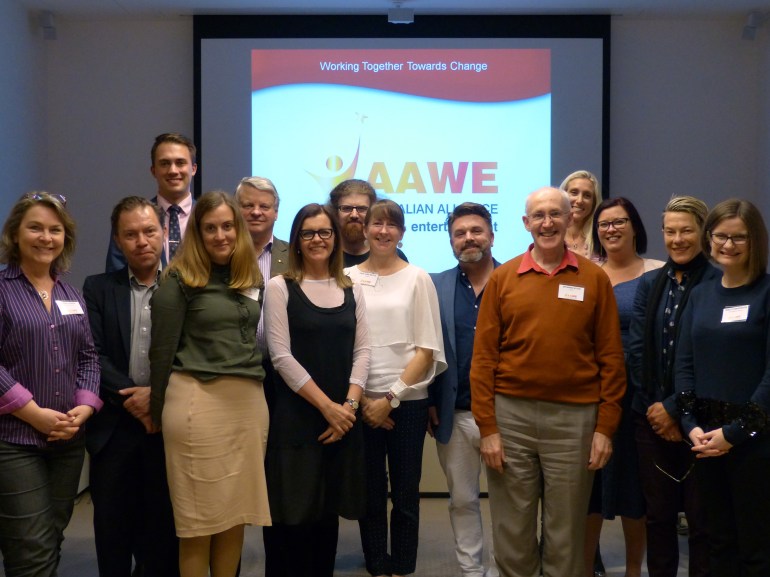AAWE.
The recent parliamentary inquiry into the screen industry recommended that the Minister for Small Business consult with small businesses to address mental health outcomes. That’s a positive step forward for mental health charity Entertainment Assist, which recently developed the Australian Alliance for Wellness in Entertainment (AAWE). Jackie Keast speaks to general manager Susan Cooper.
In 2016, Entertainment Assist released research which painted a dark picture of the mental health and wellbeing of those working in the entertainment industry.
It showed that suicide ideation was six times greater among entertainment professionals when compared to the general population, suicide planning four times greater, and suicide attempts more than double. Indications of moderate to severe anxiety were 10 times higher and symptoms of depression five times higher. Alcohol consumption rates were twice as high, and rates of other drug use ranged from seven to 12 times as high.
Conducted by Victoria University, the research drew on 36 in-depth interviews and an online survey of more than 2400 workers from all sectors of the entertainment industry, including screen, music and theatre.
Among the report’s other key findings was that negative culture exists within the entertainment industry, fostered by extreme competition and “bruising” work environments. This included racism, bullying, sexual assault and sexism that was ignored or dealt with inadequately; a result that seems perhaps unsurprising in the #metoo era.
Overall the report suggested that the industry was in “severe distress” and in urgent need of early prevent and intervention programs.
Last year, Entertainment Assist presented some of these findings in a submission to the House of Representatives inquiry into the growth and sustainability of the screen industry, conducted by the Standing Committee on Communications and the Arts.
In its report to government, the committee said the statistics presented were “concerning and should be investigated further”, and recommended that the Minister for Small Business consult with small businesses within the entertainment industry on how mental health, as well as other OH&S issues, be addressed into the future.
Entertainment Assist general manager Susan Cooper tells IF while there is still a long way to go to address the entertainment industry’s poor mental health outcomes, the recommendation from the committee was “beyond sensational”.
“We were one voice amongst hundreds of submissions in the industry and that’s a really significant sign that the Commonwealth took notice.”
She says it was fitting that the inquiry was focused on sustainability. “Our argument was: how can you have a sustainable industry when we’ve got people that are unwell in it?”
However, Cooper says addressing the issue of mental health is a shared challenge that the industry also has to take responsibility for. “It’s not just our song to sing – the song needs to be song by all individuals and employers within our industry.”
To that end, Entertainment Assist has developed and is convening the Australian Alliance for Wellness in Entertainment, which it launched on World Mental Health Day last October. Screen Producers Australia and the Media, Entertainment and Arts Alliance are among the cross-sector alliance’s founding members.
Cooper describes the alliance as a “peer to peer” initiative, with each member required to commit to a statement of values around respect, integrity, empathy, courage and collaborative leadership, with aim to provide advocacy and support for the mental health and wellbeing of their colleagues.
The key purpose of the alliance is to develop and action a “prevention-first” framework. With an emphasis on education, Cooper says such a framework seems the clearest way to deliver systemic change.
“Part of the role of the wellness alliance will be to look at curriculum development: What do we need to add to industry courses so that people are not just taught craft, they’re actually also taught how to be mindful and aware of the self?”
Towards the end of last year the alliance ran industry forums to identify what wellness initiatives exist currently, what’s missing at the moment, and to formulate industry priorities. These forums formed the first stage of a research project that is being conducted in collaboration with mental health institute Everymind to inform the framework. This is being followed by an online survey, currently open to all, to obtain a wider set of results.
Cooper says the forums underscored the importance of education, as well as peer support and also raised the potential of mental health risk management in the same vein of physical OH&S risk assessments.
Going forward, she’s keen for each sector of the entertainment industry to work out its specific requirements. “It is not a one-size-fits-all program.”
She says the screen sector is probably the quietest of those working across entertainment when it comes to talking about mental health, perhaps due to its male-dominated nature.
“It’s a significant challenge, because unless we get… these people to start talking about it, we can’t start to move forward.”
Cooper says the importance of talking to a trusted peer, friend, family member or a GP if you have a mental health concern can’t be stressed enough.
“The key thing I think in all of this is that we really encourage people to have heart; it’s having heart for self, heart for peers.”
The survey takes around 25 minutes to complete, and is available here.
Lifeline: 13 11 14 www.lifeline.org.au
Beyondblue support service line: 1300 22 46 36



